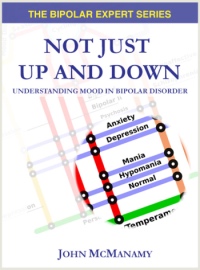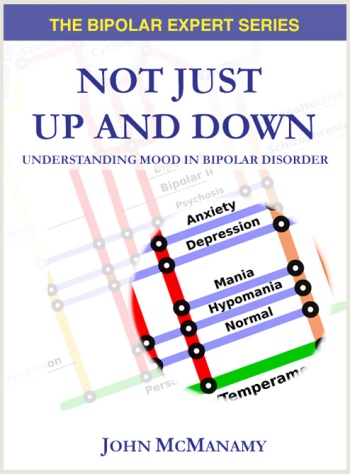Antidepressants - The Bad News First
 |
No one in their right mind would even think of taking one. But what if you're depressed?
|
Perhaps we should start with the bad news first. The strongest scientific evidence we have is not how well antidepressants work, but how badly they perform and how harmful they may be to certain individuals. Here's the low-down:
Two meta-analyses of the FDA clinical trials conducted by Irving Kirsch of the University of Connecticut in the late 1990s-early 2000s of Pharma-sponsored clinical trials - including ones not published - in the FDA database found that antidepressants worked only marginally better than placebos. There have been a number of expert rebuttals to these findings, but no actual study to contradict Kirsch.
My New Book!

Purchase now.
For a drug company to receive approval to market an antidepressant, it must show, aside from safety and other factors, that the test drug gets at least 50 percent of the test population at least 50 percent better. This 50 percent symptom-reduction criterion is known as "response." In the first round of the largest antidepressant trials ever - the STAR*D trials underwritten by the NIMH over the mid-2000s - just 47 percent of the patients responded over 12 to 14 weeks.
A higher standard is "remission," virtual elimination of all symptoms. In the first round of STAR*D, just 28 percent of the patients remitted. In the next round, of those who failed their antidepressants in the first round and remained in the study, a quarter to a third of patients remitted after trying a different antidepressant or combination of meds. This indicates the value of experimenting with a second antidepressant after the first one has failed. But after two failures, the remission rates for a third trial of antidepressants proved negligible, indicating the futility of continuing to play pill roulette.
After four successive stages of STAR*D, 67 percent of those who remained in the study eventually remitted, but owing to relapse the true figure was 43 percent. The so-called success rate was further marred by the drop-out rates: 21 percent withdrew after level one, 30 percent withdrew after level two, and 42 percent withdrew after level three. These drop-out rates corroborate other findings showing that after six months virtually no one remains on their antidepressants.
Adding It All Up
Commenting on STAR*D, in a 2009 blog, Nassir Ghaemi MD of Tufts University noted that:
Even if antidepressants worked in the short term (2 months, which is also what the meta-analysis assessed), one-half of patients who stayed on them relapsed into depression within one year. At the one year outcome, only about 25% of patients actually had remained well on and tolerated an antidepressant, much below the levels most clinicians seem to feel occurs in their clinical experience.
One in four! According to the best data we have, just one in four individuals treated with an antidepressant get well and stay well. And this was in the best possible care setting. Is your clinician aware of this? Probably not.
More Bad News
In his 2010 book, "Anatomy of an Epidemic," author Robert Whitaker cites community surveys from the 1930s and 40s that found "fewer than one in a thousand adults suffered an episode of clinical depression each year." Well into the 1960s, depression was perceived as a single-episode illness of middle-aged and older persons.
With the coming of the antidepressant era in full force, reports Whitaker, suddenly depression was seen (in the words of the American Psychiatric Association) as "a highly recurrent and pernicious disorder."
These days, one in ten American adults experiences depression each year, which begs the obvious question: If these meds work so well, shouldn't the rates of depression be dropping significantly? As David Healy of Cardiff University in a 2003 UCLA grand rounds observed, "if SSRIs worked for depression or anxiety the way antibiotics do for GPI [syphilis], we wouldn't have the illness around anymore."
It gets worse. We pick up on the action at a session of the 2008 American Psychiatric Association's annual meeting that both Whitaker and I (unbeknownst to each other) attended.
First speaker up was Frederick Goodwin, co-author of the definitive "Manic-Depressive Illness," which had come out as a second edition the year before. As Whitaker reports:
[Bipolar] illness has been altered ... Today we have a lot more rapid cycling than we described in the first edition [which came out in 1990], a lot more mixed states than we described in the first edition, a lot more lithium resistance, and a lot more lithium treatment failure than there was in the first edition. The illness is not what Kraepelin described anymore, and the biggest factor, I think, is that most patients who have the illness get an antidepressant before they ever get exposed to a mood stabilizer.
As I recall, it was not simply a matter of antidepressants making bipolar worse. Dr Goodwin also made a strong case that for many people, clinical depression is bipolar waiting to happen. The rise in the incidence of bipolar, Goodwin noted, coincided with the introduction of SSRI antidepressants. It's not just the bipolar population that is at risk. A lot of those with so-called unipolar depression cycle in and out of depression without ever becoming manic or hypomanic - until you give them an antidepressant. Then they become bipolar.
Let's not stop there. A 2010 blog by Whitaker brought to my attention a scathing article by Giovanni Fava of the University of Bologna, whose review of the literature indicated that after six months, antidepressants "generally fail to protect" against a return of depressive symptoms. Moreover, long-term treatment "may recruit processes that oppose the initial acute effects of antidepressant drugs" and may also "propel the illness to a malignant and treatment-unresponsive course that may take the form of resistance or episode acceleration."
What may be occurring, Fava hypothesizes, is "oppositional tolerance," where, over time, the brain pushes back against the antidepressant.
Wrapping It Up
So, to review:
- The best evidence we have indicates that antidepressants are only marginally effective against depression.
- Even when the pills work. the effect tends to be short-term, with high relapse rates, low tolerance rates, and just about zero prevention effects.
- There is a strong danger of these meds turning unipolars into bipolars.
- There is the possibility (the jury is still out) that continued use of these meds may in fact worsen the long-term course of depression.
So - why on earth would someone be foolish enough to even consider taking an antidepressant? The answer is simple: For some people, antidepressants work to some extent some of the time. To anyone who has ever been caught up in a killer depression, an antidepressant is an obvious choice. Even a very slight improvement in mood may make all the difference in the world.
The pharmaceutical industry and psychiatry would have us believe that an antidepressant is a pill for all seasons. Conversely, critics of psychiatry contend we would be better off on a sugar pill (at least there's no side effects). But there is a time and a place, even for an antidepressant. The catch is we're tripping over furniture in the dark with no watch.
Up next: Shedding light on the topic ...
This article completely replaces earlier articles on antidepressants, Jan 8, 2011
 |
More articles on treatment. |




